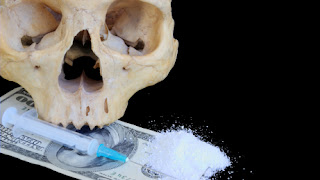
Methamphetamine, also known as meth, crystal, crystal meth, glass or tik, is a serious problem in communities across the United States. It is not among the top ten most commonly abused drugs in America, but even so it has had a devastating in many areas of the country. Unlike certain drugs like crack cocaine, it is not limited to poor urban areas, but has also spread throughout rural America. Rather than being imported from other countries, as is largely the case with marijuana, cocaine, heroin and others, the methamphetamine available on U.S. streets has mostly been produced within our own borders.
Meth is normally produced in clandestine labs, often in basements or kitchens in ordinary suburban neighborhoods or in apartment buildings where the neighbors have no idea that within feet of their own homes there are people cooking up a powerfully addictive drug and thereby committing a felony punishable by up millions of dollars in fines and up to life in federal prison. Methamphetamine is usually found in a powdered form, and it may be snorted, injected or even smoked. Though it is available for prescription use in the treatment of ADHD and obesity, the drug is rarely used in a medical context. The Drug Enforcement Administration classifies methamphetamine as a Schedule II drug, placing it in the same category as cocaine, opium and other drugs that have limited medical use and are highly dangerous and addictive.
The addictive properties of methamphetamine are among its most recognizable characteristics. Unlike many other drugs that are in widespread use, methamphetamine is practically never depicted in any kind of positive light or celebrated by those who use it. Meth is famous for being cripplingly addictive and for destroying the lives of those who use it. If you suspect that a friend or family member may be using methamphetamine, you may be able to achieve confirmation of the fact by recognizing some of the common symptoms of withdrawal.
Between the times when a meth addict is getting high, he or she will begin to manifest withdrawal symptoms that can include:
• Depression
• Lethargy
• Irritability
• Fear or paranoia
• Shaking or jitteriness
• Sweating
• Increased hunger
• Hyperventilation
• Abnormal heartbeat
• Irritability
• Headache
• Nausea
• Alternating periods of extreme wakefulness and overwhelming fatigue .
Symptoms such as these may persist for several days on end, or may last for even longer if the person has been using the drug chronically. In addition to the above symptoms, a meth addict suffering from withdrawals may harbor suicidal thoughts. It is important to be able to recognize these symptoms not only in order to discern whether a loved one may be using methamphetamine, but also for the purpose of being able to help your loved one cope with the challenges of quitting if he or she is trying to get clean.
How Does Methamphetamine Work in the Brain
Why does withdrawing from methamphetamine cause such powerful and unpleasant symptoms? The answer to this question has to do with the way in which the drug affects the body of a user. Methamphetamine causes the sudden and massive release of dopamine, a brain chemical that is associated with feelings of pleasure, motivation and euphoria. Taking the drug in large doses creates a “rush.”Unlike many drugs that also cause a release of dopamine, methamphetamine additionally blocks dopamine from being reabsorbed into the neurons, so that the chemical remains in the synapses for a longer period. Chronic use is known to cause major changes in the brain, with the result that quitting the drug results in major imbalances in neurotransmitters including dopamine. The withdrawal symptoms are essentially a manifestation of the body’s efforts to readjust to normal.

Amphetamine is also used as a performance and cognitive enhancer, and recreationally as an aphrodisiac and euphoriant.Alcohol Detox
ReplyDeleteCocaine Detox
When I quit drinking, the cravings and withdrawal symptoms were just as bad but this time there was nothing available to help. Or so I thought.
ReplyDeletehow long does heroin stay in your urine...Drug rehab center Indianapolis